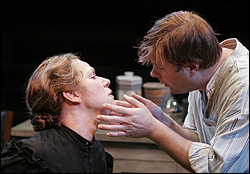I’m not sure why London audiences were reportedly so wowed by Nicholas Wright’s mangy, barking mutt of a play about Vincent van Gogh’s youthful days in London, 1873–76. Maybe it’s because they were so delighted to claim a part of him for themselves. In Seattle, despite a first-rate effort, Vincent in Brixton (at ACT Theatre through Sunday, Oct. 2; 206- 292-7676) is a bizarre flop, a biographical fantasy that contributes no insight into the artist’s creative mind—and fails utterly to stand alone as the coherent story of a created character. Sensitively directed by Kurt Beattie, the talented cast does achieve many moments of well-wrought comedy and poignant pain, but the moments are mired in a contrived melodrama with no clear narrative or thematic goal.
Vincent (Shawn Telford) makes a startling entry. Instead of the pinwheel-eyed, one-eared painter we think we know, this Vincent is a stiff, priggish preacher’s kid, a teetotaler with a total inability to control his rude tongue. Telford can’t quite control his Dutch accent, but he gives the lad a most convincing wet-behind-the-ears quality and a callow eagerness—he always seems to be leaning forward somehow without falling down. He wears a natty suit with top hat, yet his very body seems not to fit him.
He sure doesn’t fit in at the boarding house of the widow and teacher Ursula Loyer (Anne Allgood). He blurts everything out in a manner veddy un-British. When she asks if he’s a quiet sort of boarder, he yells, “I’M QUIET IN EVERY WAY!” He even declares his love at first sight for Loyer’s nubile daughter Eugenie (Emily Cedergreen). The widow lets him stay provided he never pitches woo to Eugenie. This is partly because, as we soon learn, Eugenie is sweet on another boarder, Sam Plowman (Devlin Borra), an earthy working-class lad who aspires to art school.
But Ursula’s motive is murky, and so is everybody else’s. Basically, Ursula lets Vincent stay so that the play can occur and she and Vincent can say things about art and nature evidently derived from van Gogh’s actual letters (and encounter images he later famously painted, like a pair of shoes and an empty chair). The problem is, even when the art chat is interesting, it doesn’t seem to spring from these characters.
Wright is fascinated by the impact of British worker culture on van Gogh— the poverty he saw in the streets and in Dickens, William Morris’ exaltation of the practical arts. This is indeed fascinating, but the piece only fitfully hints at it; the ideas aren’t bodied forth into souls and scenes the way ideas are in, say, Stoppard’s history-based plays. When Vincent plunks his muddy shoes down, they don’t mean what they do in the painting. They’re crude symbols of his Dutch country crudeness, reproved by widow Ursula. She becomes his much-older lover and mentor. The play’s engine is meant to be her influence on his developing mind, but this is a bildungsroman without much bildung.
The soap opera, however, is nimbly done. Allgood is a powerful presence, maternal and romantic; she shows us her whole heart, one tough muscle. She also suffers a clinical depression meant to mirror the one in store for Vincent. Allgood skillfully conveys despair, and Telford is nearly as able, but the encounters aren’t skillfully written. We never get what their intimacy was about.
Cedergreen is winningly, vigorously peevish as the daughter, and Borra radiantly kind as the workman of her dreams. His domesticity-thwarted career clunkily mirrors Vincent’s ruthless pursuit of art. Renata Friedman is cartoonishly funny as Vincent’s bitchy sister Anna, who barges in on the Loyers to rescue her brother from Brit wickedness. Though Allgood’s is the finest performance, Friedman’s is the most successful character—because she’s the simplest, and Wright can’t handle complexity. He once directed Six Characters in Search of an Author. Here he gives us five characters in search of a plot.








